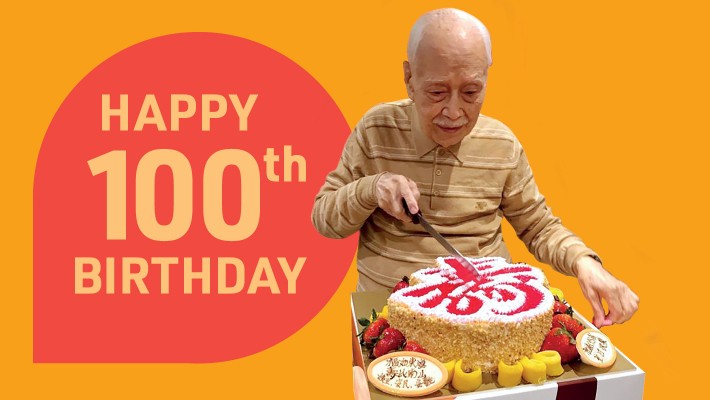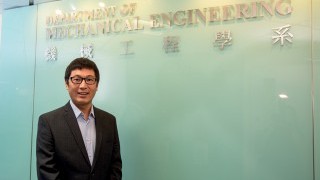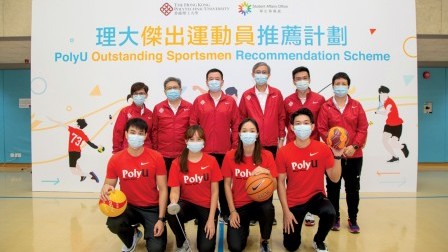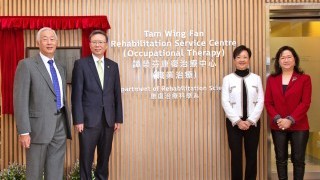Centenarian alumnus shares fond memories of his ties with PolyU
Other Articles
Congratulations to Mr Cheung Tsang-wai, the oldest alumnus of PolyU, who will celebrate his 100th birthday in March 2021.
_________________
When the University’s predecessor Government Trade School (the School) was founded in 1937, Mr Cheung was among the first cohort of students who enrolled to study mechanical engineering. Eighty years after his graduation, Mr Cheung is still very supportive of his alma mater and loves to participate in events organised by PolyU.
Born in 1921, the centenarian, who graduated in December 1940 with a Diploma in Automobile Engineering, still has vivid memories of his student life. “The School was a red-brick three-storey building on Wood Road, Wanchai. Classes for mechanical engineering were held on the ground floor," he said.
Fond memories as the first-generation of alumni
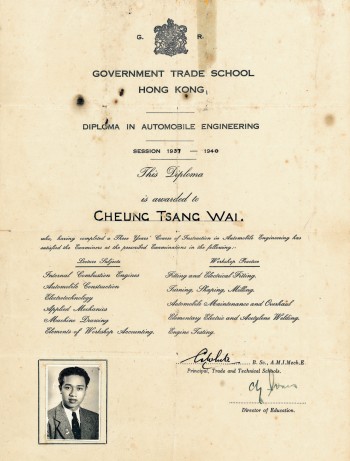
The School represents PolyU’s humble beginnings. When the School was founded in the 1930s, it had only three academic departments offering courses in marine wireless operating, mechanical engineering and building construction. “In my days, the School ran three classes only, with 20 students in each class, and the tuition fee was HK$5 per month. At that time, monthly rent for a room was about HK$8, while a rickshaw ride from Wanchai to Central cost about 50 cents,” Mr Cheung said. Back in those days, when technical education was still dominated by men, all of the students were male.
Mr Cheung said mechanical engineering students like himself needed to attend lectures in automobile construction, mechanics and machine drawing. “I took practical courses in lathe-making, milling, automobile maintenance and overhaul, and welding as well,” he added. During the summer, students of the School worked as interns at places such as Taikoo Dockyard and Whampoa Dock.
His fond memories of the School have not faded, and Mr Cheung can still recall many details from his time as a student. “Most of the teachers were expatriates. And all classes were given in English, no matter whether they were taught by foreign or Chinese teachers. As there were no textbooks at that time, we relied on the notes we jotted down during classes for revision,” he said.
“The School only had dozens of students at a very small campus. Before attending practical classes, students would change into overalls in the changing room. Therefore, students from different classes got to know each other in the changing room,” he added.
In my days, the School ran three classes only, with 20 students in each class, and the tuition fee was HK$5 per month.
Developing closer ties with his alma mater over time
Mr Cheung became a car repair and maintenance technician after his graduation in 1940. “During the Japanese occupation of Hong Kong between 1941 and 1945, people took whatever jobs they could find. Some of my classmates fled to Mainland China to work in the transport industry. I stayed in Hong Kong with my family and managed a team of government vehicle repair workers for a while before moving to Macau,” he recalled. In Macau, Mr Cheung worked in the shipbuilding industry, supervising vessel maintenance work.

Mr Cheung (third from right) visited the PolyU campus with other older alumni in 2009.
“To make a living, I even once worked at a currency exchange shop during the war,” he added. After World War II ended, Mr Cheung came back to Hong Kong and took up different kinds of work, including as a car and ship mechanic, applying the skills he learned at the School. He retired in the mid-1970s.
For many years after his graduation, Mr Cheung continued to keep in contact with his classmates who had become close friends. He also followed PolyU’s development. “I read the newspapers to keep up with PolyU’s latest news,” Mr Cheung said. He reconnected with PolyU in 2000 and participated in activities to celebrate the University’s 65th anniversary in 2002. After this event, his ties with the University continued to strengthen. In the past two decades, he has been a regular at the bi-weekly lunch gatherings attended by older alumni. Mr Cheung, who is a keen photographer, also donated two photographs he took at Huangshan to the University for a charity auction.
Mr Cheung treasures friendship, pointing out that good friends always support each other. He also enjoys his regular lunches with other alumni on PolyU’s campus, which has become a special place for them. “With its modern buildings and campus greenery, PolyU is always a beautiful place to me,” he said.
Tips for longevity

Mr Cheung attributes his longevity to Tai Chi and Qigong, which he started practicing when he was 40 years old. He still spends one hour every day doing Tai Chi to help improve his flexibility and balance. Mr Cheung also emphasises the importance of staying mentally fit. He said: “I often recall the silly but happy moments of my life. Recalling them always makes me smile.”
Having Mr Cheung among our alumni is a blessing for PolyU. He reflects the long history of PolyU which dates back to the Government Trade School (1937-1947), later evolving into Hong Kong Technical College (1947-1972) and Hong Kong Polytechnic (1972-1994) before becoming The Hong Kong Polytechnic University of today. As he celebrates his 100th birthday, we wish Mr Cheung good health and happiness.



